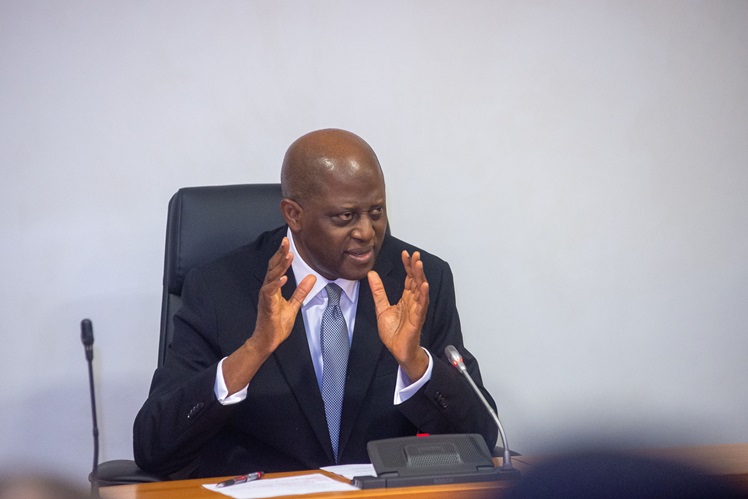Nigeria’s apex bank, the Central Bank of Nigeria, CBN, is partnering with the International Finance Corporation, IFC, a sister organization under the aegis of the World Bank Group in a bid to strengthen the nation’s private sector.
This comes amidst prevalence of a dwindling economy in the country, consistent fluctuations of the Naira and the surge in price of commodities thereby, posing a threat to both local and foreign investors who would have helped to shape the face of the country’s private business sector and its overall economic situation.
While the partnership between the apex bank and the IFC may be perceived as succour, the CBN governor, Olayemi Cardoso yesterday, reportedly received a team of delegation of the IFC, led by its Managing Director, Mr. Makhtar Dio.
The perceived success of the meeting is assumed to have contributed to the ground-breaking partnership which is likely to positively impact the private sector and consequently salvage the nation’s economy – a prospect for which the CBN has expressed high hopes especially as it boastfully took to its X handle to announce the partnership yesterday.
In a post, the CBN said, “The leadership of the CBN and IFC held a significant meeting to discuss strategies for supporting Nigeria as part of the IFC’s mandate to bridge the infrastructure gap, build productive industries and foster inclusive business approaches.
According to the regulator, “a key focus of the meeting was identifying areas to support private sector growth in Nigeria, including expanding access to credit, facilitating trade of receivables for SMEs, and promoting local currency liquidity enhancement solutions between the CBN and the IFC.”
The apex bank also added that both the CBN and IFC aim to invigorate Nigeria’s banking industry by fostering the development of financial products that meet the country’s needs and catalyse the financial ecosystem including the advancement of initiatives that Nigerian banks can readily adopt.
Recall that Nigeria holds the second-largest IFC portfolio in Africa with an active investment portfolio of $2.1bn as of April 2024.
Meanwhile, President Bola Tinubu has called on international development financiers to see Africa as a destination for growth and prosperity.
President Tinubu stated this while speaking to the IFC team during their visit to him on Thursday.
According to the president, “The IFC and the World Bank need to see Africa differently” adding that he was glad the current leadership of the IFC includes Africans.
The president noted that such inclusion would be pivotal to addressing the peculiar needs of the African continent since the privileged Africans already have knowledge of what their people need the most.
He said, “I am glad an African is at the helm of affairs at IFC, and as an African, understand that the potential for growth, peace, stability, and prosperity is here.
“The world has to see us as a continent that can help the rest of the world, and not perceive us as backwards, unstable, and with leadership problems. The expectations of the rest of the world on Africa have to change. By looking at Africa as a potential opportunity and not a danger to the rest of the free world, we can stimulate growth and propel inclusiveness,”
In his remarks, the IFC told the President that during his working visit to Nigeria, the IFC had engaged in productive discussions with Nigerian partners to enhance agriculture, increase food production through irrigation farming, upgrade transport networks, and bolster regional integration.
One of the deals made during this visit was the $23.3m loan agreement with Johnvents Industries Limited, a leading agribusiness for economic development and agricultural transformation, to develop the cocoa sector.
Nigeria’s Private Sector in the Last Two Years
Within the last two years, Nigeria’s private sector and economy have encountered several challenges such as the lingering effects of COVID-19 which hit the entire world hard in 2020; volatile oil prices and significant inflation in the Nigerian markets which consequently reduced consumer purchasing power and raised both individual and families living cost and organisational operating expenses far beyond expectation.
The financial burden on companies that depend on imported goods and services has also experienced significant increase within the last two years as a result of the naira’s depreciation in favour of international currencies, thereby scaring away both foreign and local investors in the country. Little wonder some Nigerians would rather set up their businesses abroad in recent time.
Also, Nigeria’s private sector has faced difficulties as a result of regulatory uncertainties. An intricate commercial climate has been brought about by modifications to tax laws, foreign exchange regulations, and import limitations. However, in spite of these obstacles, the private sector is striving to overcome its limitations by utilising technology, innovation and smart alliances such as the recent partnership announced between the CBN and IFC.
Through these efforts and more, the private sector has made strides particularly with some of its key developments and achievements in some sectors such as technology and innovation, agribusiness and security, renewable energy and real estate and construction among a few others.
While these are obviously not enough, some of the efforts being made include the increasing internet penetration and mobile phone usage whereby companies like Flutterwave, Paystack, and Interswitch have expanded their services, offering innovative payment solutions that have enhanced financial inclusion and e-commerce in the country.
Similarly, private companies’ investment in modern farming techniques, processing facilities and supply chain improvements to boost productivity and reduce post-harvest losses, though relatively low, have proven to be another viable means to salvage the unfortunate situation of the nation’s private sector while making the most impact on its overall economy.
Significant efforts are also being made by private investors towards providing alternative energy solutions driven by solar power, mini-grid systems and off-grid solutions to address the energy needs of underserved communities and provide limitless access to electricity.
But these are not enough! Moreover, only a handful of private local investors have ventured into any form of sustained effort towards heralding the course for change and the redemption the Nigerian private sector from its plight while offering significant boost.




